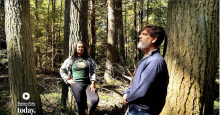You are here
Approaching Ecosystems as Family Networks: Studying the Decline of Red-Tailed Hawks

Keshia De Freece Lawrence, Harvard Forest’s Indigenous Education Specialist, is conducting research to investigate the decline of red-tailed hawks. Her work is inspired by years of observing an alarming number of dead hawks along roadsides. De Freece Lawrence, a member of the Ramapough Lenape tribe, combines her academic background with her Indigenous heritage to approach the issue holistically, viewing the hawks not just as individual animals but as part of a broader ecological "family network." While Western scientific methods often focus narrowly on addressing symptoms—such as increasing prey populations to support hawks—Lawrence emphasizes the importance of considering the entire ecosystem’s health.
Drawing on her experience with a Canadian subarctic research center that integrated Indigenous and government science perspectives, De Freece Lawrence applies instinct and deep cultural knowledge alongside traditional scientific surveys. Her work advocates for stronger collaboration between Indigenous communities and academic institutions, highlighting the value of Indigenous ecological wisdom. With optimism that her research, and the partnerships it fosters, will encourage greater inclusion of Indigenous voices in institutions like Harvard, De Freece Lawrence sees this moment as a pivotal step toward building protocols that respect and integrate diverse ways of knowing. Readers can learn more about her work and its impact in a recent Boston Globe story.
Readers can learn more about DeFreece Lawrence's work as featured in a recent Boston Globe story (view PDF) and via Sovereign Science's storymap, Mapping Collaborative Research.
-
To learn more about the effects of rodenticides on wildlife in Massachusetts, please read this Harvard Animal Law Clinic petition.

